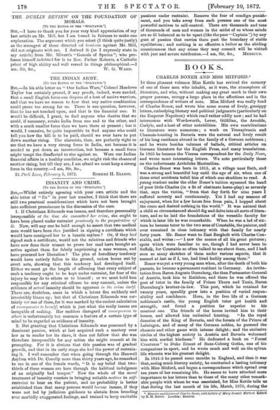INSANITY AND CRIME.
[To THE EDITOR OF THE "SPECTATOR."]
Sur,—Whilat entirely agreeing with your own article and the able letter of " Ex " in your last number, I think that there are still two practical considerations which have not been brought into sufficient prominence in the discussion of the case.
1. If Christiana Edmunds was insane, and therefore presumably irresponsible at the time she committed her crime, she ought to have been placed under restraint previously to the perpetration of it. Now, will any one be bold enough to assert that two medical men would have been then justified in signing a certificate which would have consigned her to a lunatic asylum? Or, if they had signed such a certificate, would not the relatives and friends who have now done their utmost to prove her mad have brought an action against them for falsely imprisoning a sane woman, and have procured her liberation ? The plea of hereditary tendency would have entirely fallen to the ground, unless borne out by overt acts, showing that this tendency had developed itself. Either we must go the length of affirming that every subject of such a tendency ought to be kept under restraint, for fear of the injury he may do to others or to himself ; or we must hold him responsible for any criminal offence he may commit, unless the evidence of actual insanity should be apparent in the crime itself. There are, doubtless, cases in which a latent fire suddenly and irresistibly blazes up ; but that of Christiana Edmunds was cer- tainly not one of these, for it was marked by the coolest calculation of consequences to herself, which is just what the really insane are incapable of making. Her reckless disregard of consequences to others is unfortunately too common a feature of a certain type of mind to be regarded as evidence of insanity.
2. But granting that Christiana Edmunds was possessed by a dominant passion, which at last acquired such a mastery over her as to render her its slave, it does not follow that she was therefore irresponsible for any action she might commit at its prompting. For it is obvious that this passion was of gradual growth, and that in its early stage she had the power of restrain- ing it. I well remember that when going through the Hanwell Asylum with Dr. Conolly more than thirty years ago, he remarked to me in one of the female wards, " It is my belief that two- thirds of these women are here through the habitual indulgence of an originally bad temper." Now the whole of the moral treatment of insanity consists in bringing suitable motives to self- restraint to bear on the patient, and no probability is better established than that many persons would become insane, if they were not led by judicious guidance to abstain from brooding over morbidly exaggerated feelings, and trained to keep excitable
passions under restraint. Remove the fear of condign punish- ment, and you take away from such persons one of the most powerful motives to self-control. There are thousands and tens of thousands of men and women in the midst of us whose minds- are so ill balanced as to be upset (like the poor " Captain '.') by any gust of passion that carries them past the boundary of stable- equilibrium ; and nothing is so effective a ballast as the abiding consciousness that any crime they may commit will be visited with just and severe retribution.—I am, Sir, &c., MEDICUB.


































 Previous page
Previous page